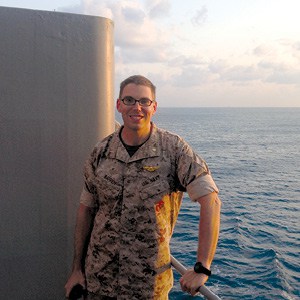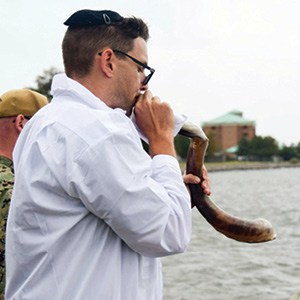Rabbi Yonatan “Yoni” Warren.
Virginia native Yonatan “Yoni” Warren hopes to be stationed in Norfolk, Virginia long enough to check one specific box. “I expect to be stationed here between four to six years,” says Warren. “That should be long enough to rebuild a vibrant Jewish community on base that will meet diverse spiritual, religious, and cultural needs. To make this happen, I’ll need to get all parties on board including the local religious community that has provided strength and support to the transient military community for so long.”
Ordained by the Jewish Theological Seminary in 2011, Warren was born in Hampton, Virginia and attended Hebrew Academy of Tidewater, the same school where his father taught science until the Middle School closed. He remembers waiting for his father to pick him up from the JCC on Newport Avenue and using that time to memorize the list of area synagogues posted outside the Center.
Before being assigned to Norfolk in 2018, Warren was stationed in Okinawa, Japan and then at the prestigious U.N. Naval Academy in Annapolis, Maryland where he served as Navy Chaplain. That is where he met Herm and Patty Shelanski.
“Chaplains are wonderful,” says Patty Shelanski. “They mentor and counsel everyone regardless of status or affiliation. Yoni is amazing.”
Warren is currently the Jewish naval chaplain at the Portsmouth Naval Hospital.
Navy chaplains have four core capabilities:
- Provide for our own.
- Facilitate for others.
- Care for all.
- Advise the command.
“Especially since I’m working at the hospital, the majority of my time is in the ‘care for all’ category. I’m trying to spend a little more time on the first, ‘provide for our own,’” says Warren.

Dakotah A Hendricks, USN, Photographer Rabbi Yoni Warren blows the Shofar.
When he’s not deployed, Warren picks up his children at Strelitz International Academy and works with Rabbi Gershon Litt connecting Jews that serve in the military with outlets in the religious community, such as Ohef Sholom, Congregation Beth El, Temple Israel, B’nai Israel and Chabad for the High Holidays.
Conversely, Warren’s vision is to build a vibrant Jewish military community on base at the Commodore Levy Chapel.
“It’s not just prayer, but there is prayer,” says Warren. “It’s not just food, but there is food. It’s not just Torah, but there is Torah. It’s not going to take the place of synagogues that meet specific religious and community needs, which is why we are actively outsourcing and sending people to them. I’m hopeful that the chaplains and staff who serve the Jewish military, and our local Jewish institutions will reciprocate and send people to our community on base. It’s been challenging. Sometimes, I find out there are other Jewish military just by picking my kid up from Strelitz and seeing someone in uniform.”
Torah on Tap was a Beth El outreach that Warren adopted to provide a Jewish learning opportunity for military personnel, most of whom do not live on base, or wish to go back to the base after they leave work. This ‘crafty’ approach to Torah learning is advertised through Beth El, and always takes place at venues that serve beer.
Rabbi Warren is married to Leora Skolnik with whom he has two children. She is the daughter of a rabbi. Warren gets high marks from Rabbi Gerald C. Skolnik, the spiritual leader of the Forest Hills Jewish Center in New York. Skolnik blogs often about his son-in-law’s ability to face unique challenges specific to the military. “When people think of rabbis, they instinctively associate them with synagogues. That’s where most people encounter rabbis—when they come to services. In reality, today’s rabbis play many different roles outside of synagogues, from the halls of academia to hospital and military chaplaincies. All are important. But of these, none is more important than the chaplaincy and I say that as a pulpit rabbi.”
“I love teaching Torah,” says Warren. “But for me, the transcendent moments of chaplaincy happen in quiet conversations on the bridge wings of a ship while crossing the Atlantic. These moments lead to the safe space to cry when a ‘Dear John’ letter arrives. Or, sitting in a Sukkot at Camp Leatherneck in Lashkar Gah having dinner and letting a nice Jewish sailor feel Jewish.
Lisa Richmon

